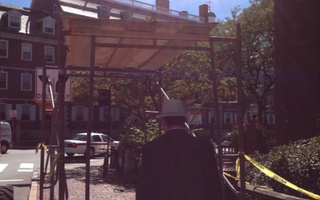As pointed dialogue about climate change takes place both on and off campus, the Harvard Forest Seminar Series this semester seeks to engage students and the public in discussion on environmental issues.
Hosted most Fridays during the fall semester, the series covers issues ranging from “forest-climate interactions in an era of global change” to “diversity patterns in epiphytic lichens.” Seminars take place at the Fisher Museum, located on the forest grounds, and are also streamed online.
“Many of the topics would be germane to what students are learning in class and elsewhere,” said David A. Orwig, a senior ecologist at the Harvard Forest.
Visiting experts from both American and international universities speak at the seminars, maintaining the Forest’s connection to larger environmental and ecological academic communities. Many of the speakers hold the Harvard Bullard Fellowship in Forest Research.
“[The seminar series] is an extension of the educational mission that is part of Harvard Forest as well,” said Audrey Barker Plotkin, who has run the series since 1999. “That [educational mission] includes many different groups, from students—you would imagine the seminars would appeal to undergraduate and graduate students—[to] informed community members.”
“It’s a great way to keep our great and small science staff plugged into the larger world of ecology and conservation,” Plotkin said.
Located nearly 70 miles away from Harvard Square in Petersham, Massachusetts, the Forest spans more than 3,500 acres and serves as an important site for research in biodiversity studies, conservation and management, and forest-atmosphere exchange. The Forest receives funding from the National Science Foundation.
Beyond the seminar series, undergraduates also engage with the Forest through course and program offerings. During the spring semester, Freshman Seminar 21w: “Research at the Harvard Forest: Global Change Ecology-Forests, Ecosystem Function, the Future” gives 11 freshmen the opportunity to spend multiple weekends at the Forest.
The Forest also offers a week-long program during January Term, when 10 students spend a week living and learning in the field, and an 11-week summer research program.
“I do think it’s important for Harvard students to keep in touch with what’s going on out here,” Orwig said.
Read more in Faculty News
White House Honors SEAS DeanRecommended Articles
-
 Scaffolding Near the Kennedy School, Kind Of
Scaffolding Near the Kennedy School, Kind Of -
Pests Invade New England ForestsInvasive pests are proving to be an increasingly damaging problem for New England’s natural ecosystems as they continue to evade ...
-
 When To Do Nothing
When To Do Nothing -
 Left Alone, Forests Can Bounce Back
Left Alone, Forests Can Bounce Back -
10 Courses You Should Be Taking this SpringShopping week is over, but when reading assignments get boring, you might want to check out some of the passionate (and perhaps hyperbolic) prose in Harvard’s Q Guide. Here are some of the comments that stand out, ranked in order of ascending score.
-
 1. Foxglove
1. Foxglove













